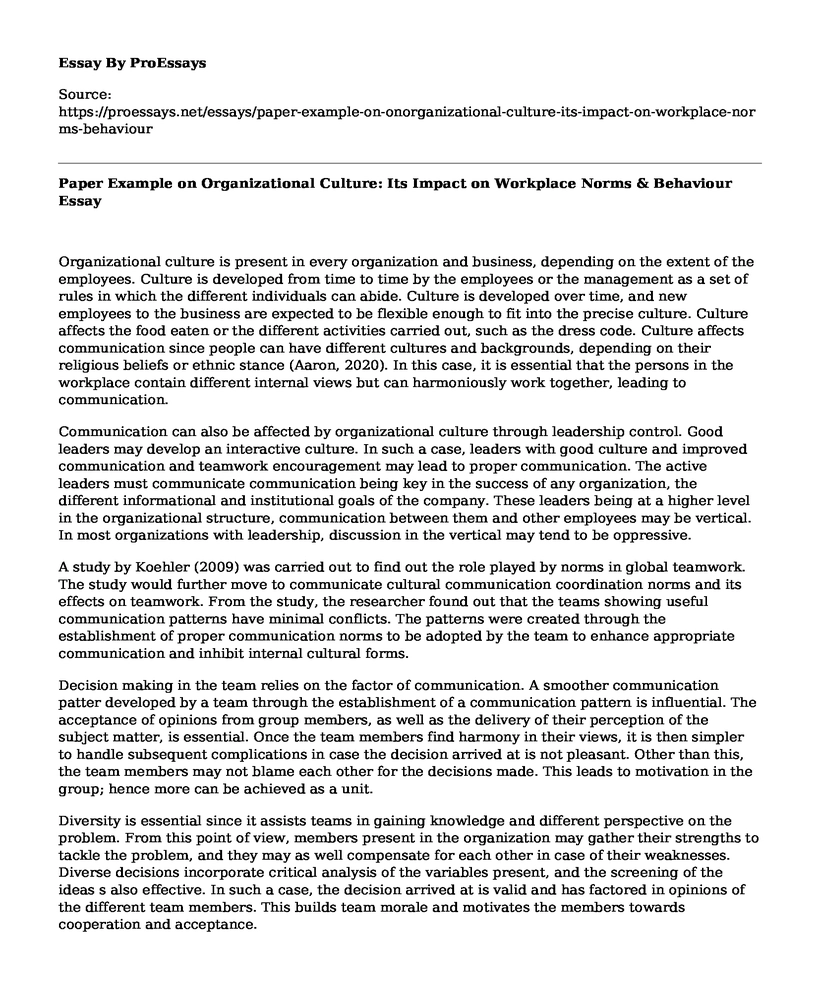Organizational culture is present in every organization and business, depending on the extent of the employees. Culture is developed from time to time by the employees or the management as a set of rules in which the different individuals can abide. Culture is developed over time, and new employees to the business are expected to be flexible enough to fit into the precise culture. Culture affects the food eaten or the different activities carried out, such as the dress code. Culture affects communication since people can have different cultures and backgrounds, depending on their religious beliefs or ethnic stance (Aaron, 2020). In this case, it is essential that the persons in the workplace contain different internal views but can harmoniously work together, leading to communication.
Communication can also be affected by organizational culture through leadership control. Good leaders may develop an interactive culture. In such a case, leaders with good culture and improved communication and teamwork encouragement may lead to proper communication. The active leaders must communicate communication being key in the success of any organization, the different informational and institutional goals of the company. These leaders being at a higher level in the organizational structure, communication between them and other employees may be vertical. In most organizations with leadership, discussion in the vertical may tend to be oppressive.
A study by Koehler (2009) was carried out to find out the role played by norms in global teamwork. The study would further move to communicate cultural communication coordination norms and its effects on teamwork. From the study, the researcher found out that the teams showing useful communication patterns have minimal conflicts. The patterns were created through the establishment of proper communication norms to be adopted by the team to enhance appropriate communication and inhibit internal cultural forms.
Decision making in the team relies on the factor of communication. A smoother communication patter developed by a team through the establishment of a communication pattern is influential. The acceptance of opinions from group members, as well as the delivery of their perception of the subject matter, is essential. Once the team members find harmony in their views, it is then simpler to handle subsequent complications in case the decision arrived at is not pleasant. Other than this, the team members may not blame each other for the decisions made. This leads to motivation in the group; hence more can be achieved as a unit.
Diversity is essential since it assists teams in gaining knowledge and different perspective on the problem. From this point of view, members present in the organization may gather their strengths to tackle the problem, and they may as well compensate for each other in case of their weaknesses. Diverse decisions incorporate critical analysis of the variables present, and the screening of the ideas s also effective. In such a case, the decision arrived at is valid and has factored in opinions of the different team members. This builds team morale and motivates the members towards cooperation and acceptance.
The quality improvement process is a broad connected path that involves a system of continuous improvement in the delivery of service or the product. Various individuals have described continuous improvement, like undertaking tasks. The effect of teamwork on the development of quality improvement is diverse (Cumbler et al., 2016). Quality improvement gains from teamwork through interpersonal improvement in the level of communication. In such a case, a team communicating effectively has better interpersonal skills; the quality of work can be corrected and amended accordingly hence reduced waste, scrap, and rework.
References
Aaron, G. (2020). Below the tip of the iceberg: How organizational culture impacts communication at the workplace | CQ Net - Management skills for everyone. CQ Net - Management skills for everyone!. Retrieved 22 April 2020, from https://www.ckju.net/en/dossier/how-organizational-culture-impacts-communication/1255.
Koehler, T. (2009). What role do norms play in global teamwork? The influence of cultural communication and coordination norms on team processes in internationally distributed teams (Doctoral dissertation).
Cumbler, E., Kneeland, P., & Hagman, J. (2016). Motivation of participants in an interprofessional quality improvement leadership team. Journal Of Interprofessional Education & Practice, 3, 5-7. https://doi.org/10.1016/j.xjep.2016.03.005
Cite this page
Paper Example on Organizational Culture: Its Impact on Workplace Norms & Behaviour. (2023, May 30). Retrieved from https://proessays.net/essays/paper-example-on-onorganizational-culture-its-impact-on-workplace-norms-behaviour
If you are the original author of this essay and no longer wish to have it published on the ProEssays website, please click below to request its removal:
- Communication in the Organizational Environment
- Steve Jobs and the Rise of Apple Corporations Essay
- The Phenomenon of Leadership Essay Example
- Social Work Macro Practice Paper Example
- Essay Example on Johnson and Johnson's Pharmaceuticals
- Essay Example on Embrace Diversity for Creative Success: Nissan's Cross-Cultural Approach
- Decision Making: The Pivotal Process of Company Growth - Essay Sample







